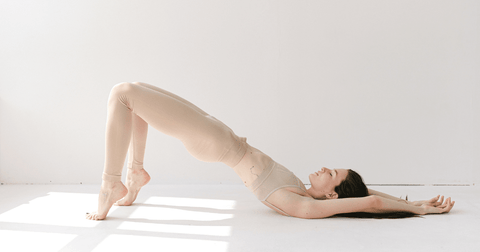How you sleep when on your period can make a big difference in how easily it arrives each month. Deep, quality sleep is essential for healthy hormones, while insomnia on your period can exacerbate PMS—which in turn can make a bad night’s sleep even worse.
This article includes practical tips and best practices for how to sleep when on your period. It covers:
- Why PMS makes sleep on your period more difficult
- How tuning into your body’s needs can help you address insomnia on your period
- Experts’ top tips for getting your best sleep—on your period and all month long
- The best sleeping positions for maximum comfort during your period
- How to prevent your period from leaking while you sleep
PMS & sleep on your period
How you sleep—whether you’re on your period or not—is closely connected to mental health and well-being. Sleep allows our brains and bodies to reset and safely figure out the “hard stuff” we experience in our day to day lives.
Research shows women report poorer sleep quality and have higher risk for insomnia than men. [1] Sleep quality and circadian rhythm can be affected by many factors, including the fluctuating reproductive hormones of the menstrual cycle. Menstruating women (even those without significant period complaints) often report poorer sleep quality during the premenstrual week compared to other times in their cycle. [2]
Sleep disturbances are one symptom of PMS, or Premenstrual Syndrome. PMS sleep issues often manifest as insomnia, daytime fatigue, or both. Research suggests women with PMS are at least twice as likely to struggle with insomnia during their period, which can cause them to feel tired during the day. [3]
Listening to your body to help sleep on your period
How you sleep while you’re on your period may be different from how you sleep while you’re not menstruating—and not just because PMS symptoms can make sleep on your period more difficult.
Your body’s hormonal rhythms change throughout the month when you have a menstrual cycle, and by extension, so your body’s needs—including your sleep needs.
That’s not to say that sleep issues on your period are something you have to ‘put up with’ just because you menstruate. However, it’s also important to recognize that caring for your cycling body may mean caring for yourself differently throughout the month, especially as it pertains to rest.
When we reframe issues like PMS fatigue or insomnia as period-specific needs rather than period-specific problems, our approach may change. For example...
If you struggle with PMS fatigue:
Say menstruation drains your energy levels during the day. What if you saw taking a nap between Zoom meetings during your period as a form of self-care, rather than a sign of laziness? A way to support your hormones in their neediest state, rather than fighting against them? Would you give yourself permission to sleep more on your period, without guilt?
If you struggle with insomnia on your period:
Or say insomnia on your period keeps you tossing and turning at night. What if, instead of chasing a goal of MORE sleep on your period, your goal was instead BETTER sleep on your period? And the road to better sleep can start with simply listening to your body.
What other symptoms or emotions do you feel during your period? Could they be affecting your sleep? Sometimes the key to better sleep is to focus on things that impact sleep, rather than sleep itself.
For example, increased anxiety is common before and during menstruation. Research shows PMS anxiety strongly impacts sleep quality, suggesting that better mood support may also improve how you sleep on your period. [3]
Whether in pursuit of less anxiety or more restful sleep, all self-soothing techniques have the same effect: they lower your heart rate, deepen your breath, and work to increase your sense of safety and calm, even in times of stress or pain. Examples of self-soothing techniques for PMS anxiety are here.
Tips for easing insomnia on period
Because there isn’t just one “right” way to approach good sleep hygiene, the best way to sleep on your period depends on your life and goals. Be open-minded to exploring different approaches until you find something that clicks. And be patient with yourself; building new habits takes time!
The Centers for Disease Control and Prevention (CDC) offer the sleep tips below. This list by no means exhaustive, but does help condense much of what scientists have learned about best sleep practices into a simple, 5-step approach: [4]
1. Consistency is key
Try to go to bed at the same time each night and get up at the same time each morning, including on the weekends.
2. Set the mood for sleep
Do what you can to make your bedroom as quiet, dark, and relaxing as possible. Adjust the temperature to what’s comfortable for you.
3. Remove distractions
Keep screens in your sleep space to a minimum; consider removing devices like TVs, computers, and phones from your bedroom.
4. Fuel for sleep success
Avoid large meals, caffeine, and alcohol before bedtime.
5. Move during the day
Being physically active during the daytime can help you fall asleep more easily at night.
Supporting your menstrual health with deep, restful sleep isn’t just important while you’re on your period. How easily your period arrives each month is thought to be a ‘fifth vital sign’, or a product of your overall hormonal health. Because your hormonal cycle is always happening, it’s important to support your hormones with healthy sleep habits all month long, not just during menstruation.
Best position to sleep when on your period
Position is critical for how you sleep when on your period. Getting comfortable can be harder during menstruation, especially if insomnia on your period is caused by painful cramps. But using effective cramp relief and drawing more awareness to your natural sleeping positions can help.
Can you remember a night during your period when you slept particularly well? Do you remember the position you were in when you fell asleep or woke up? Tracking your sleep positions may not come to mind when you think about sleep hygiene, but it's important all the same.
While no one position will be best for everyone, some women find that lying on their side in the fetal position, with their knees together, helps ease cramps by relieving pressure in the abdomen. Other women find that sleeping on their back with a weighted blanket, a heating pad on their lap, or some pillows under their knees can make for the best sleep on their period.
But feel free to explore different positions and note what feels most comfortable. Remember, our bodies may have unique needs while we’re on our period, so you may find your best position for period sleep is different from what you prefer when you’re not menstruating.
How to sleep when on your period to prevent leaking
While period leaks are normal and common, midnight bathroom runs or anxiety about waking up to a mess can affect sleep on your period all the same.
Thankfully menstruators have never had more menstrual hygiene options, from pads and tampons to menstrual cups and period underwear. Whichever you choose, the most important thing is that it’s comfortable for you! Otherwise it’s just another barrier between you and peaceful sleep on your period.
Some women find pads or period underwear to be more comfortable for sleep, since they’re not inserted into the vagina. While period underwear is generally more expensive than overnight pads, it’s reusable, feels less bulky, and can hold a lot of blood—sometimes up to 3-5 tampons worth, depending on the style and brand.
Most period underwear is also lined with gussets that extend all the way up to the waistband in the front and back—perfect for back or stomach sleepers, whose blood can pool outside the confines of a typical pad.
This information is for educational purposes only. It is not a substitute for professional medical advice, and is not intended to diagnose, treat, cure, or prevent any condition.
References
1. Aaronson, L. S., Pallikkathayil, L., & Crighton, F. (2003). A qualitative investigation of fatigue among healthy working adults. Western journal of nursing research, 25(4), 419-433.
2. Nowakowski S, Meers J, Heimbach E. Sleep and Women's Health. Sleep Med Res. 2013;4(1):1-22. doi:10.17241/smr.2013.4.1.1
3. Jehan S, Auguste E, Hussain M, Pandi-Perumal SR, Brzezinski A, Gupta R, Attarian H, Jean-Louis G, McFarlane SI. Sleep and Premenstrual Syndrome. J Sleep Med Disord. 2016;3(5):1061. Epub 2016 Aug 3. PMID: 28239684; PMCID: PMC5323065.
4. https://www.cdc.gov/sleep/about_sleep/sleep_hygiene.html







